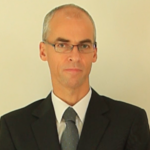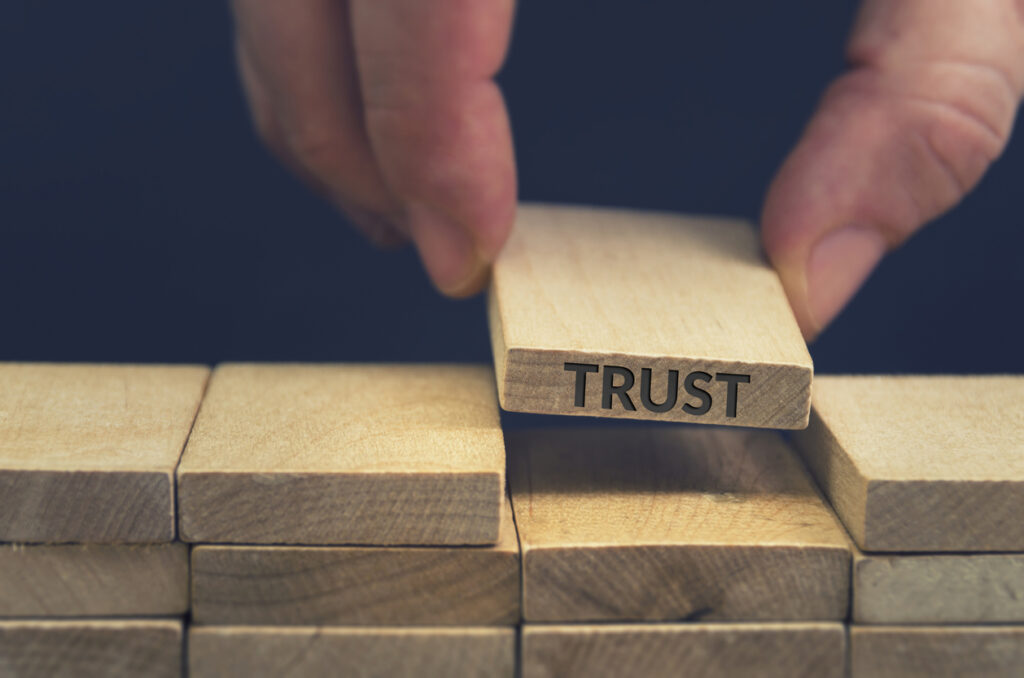Trust is about confidence and faith.
If you trust a person or an organisation you expect them to act not only in their own interest, but in your interest too. You have confidence in them keeping their word and doing what they say they will do. You have faith in their reliability and consistency. If they fail to meet these expectations it diminishes your trust.
Trust is a success factor in any project or endeavour. If trust fails then cooperation, collaboration and even healthy competition become untenable.
Trust underwrites the interactions between businesses. If businesses dishonour their commitments, fail to meet their contractual obligations or neglect to pay their debts then you will stop working with them.
The power of the law cannot replace the loss of trust, since the law itself depends on trust. We trust our judges and our juries to act fairly, applying the law equitably and without prejudice.
Yet something has changed in the modern day world. We have entered an era of lost trust, when we no longer believe in our business leaders, our politicians, or even our experts. If trust enables society, then lost trust disables it. When we consider the many crises facing us today, from pandemics to climate change to global recession, it hardly seems alarmist to suggest that the loss of trust has become an existential threat to the world we know.
So how do we restore trust? How do we know who should be trusted?
It seems we have entered an era of lost trust, when we no longer believe in our business leaders, our politicians or even in our experts.
Who can you trust?
Earlier in this series we considered what it means to be an ethical colleague. I suggested that an ethical colleague is someone who embraces three simple moral values: to nurture others; to nurture the wider community; and to nurture the biological world. An ethical colleague is honest, consistent, and interested not only in their own wellbeing but also in yours. The ethical colleague understands and takes responsibility for the impacts their actions. These characteristics effectively define someone of integrity – and thus provide a straightforward and yet powerful answer to our question.
Who can you trust? Virtually by definition, you can trust a moral person.
Trust in the workplace
In the workplace, therefore, we can trust colleagues who are moral. A moral colleague will look out for you. They will be honest with you. They will stand by their word. Morality defines the characteristics that make a person worthy of your trust – therefore the person you can trust is the moral one.
While this convincingly applies to our peers in the workplace, however, we must also ask if it is applicable to our business leaders.
Is your manager to be trusted?
There is an imbalance of power in the relationships we have with our leaders, executives or managers – yet this need not compromise their entitlement to our trust. If they are moral, displaying the characteristics I outlined above and explored here, then our needs, interests and wellbeing will matter to them alongside their own. A degree of selflessness is a crucial attribute of the ethical manager.
This is increasingly recognised within the business community. Progressive businesses are now demanding higher levels of integrity from their executives. Lapses in ethical standards generate a strong likelihood of managers or executives finding themselves summarily fired.
So the answer to whether you can trust your manager is a simple one: ‘yes – as long as they are moral.’
Can businesses be trusted?
What type of businesses can we trust?
The pattern to my answers is no doubt becoming apparent. Honesty generates trust. Integrity and inclusiveness generate trust. If you are asking what type of business you can trust as a stakeholder or a client, then your answer is that you can trust an ethical business – a business with morality as well as profit at its heart, a business that commits itself not just to efficiency, market dominance and share value, but also to the individuals who work within it, to the customers or clients it serves, to the surrounding community and to the environment.
Not only is this a trustworthy business, it is the type of business you will want to work for or lead.
You can trust an ethical business – a business with morality as well as profit at its heart.
The normalisation of selfishness
So why have we lost trust in so many aspects of our society? Why do we trust our business leaders less than in the past?
Two important social factors contribute to this:
- The normalisation of selfishness
- The politicisation of language
From the 1980s onwards, our politicians and economists have encouraged a view of humans as purely selfish entities. They argue that not only is this human nature, but that it is also a good in itself. Selfishness powers the consumer-orientated economy, helps businesses become profitable and generates a ‘trickle-down effect’ that benefits everyone.
There have indeed been dividends from this approach, particularly in poorer countries where overall poverty has been significantly reduced.
Yet this emphasis on selfishness, and on profit at all costs, is now seen to be failing our society both ethically and economically, while also fuelling distrust. You cannot trust a person or an organisation if their sole driving force is self-interest. When it comes to the crunch, the interests of a selfish person or selfish organisation will always trump yours. They won’t be looking for ‘win/win’ outcomes; they will be seeking an outcome of ‘winner takes all’.
So we come to the present – a world in crisis: highly polarised, profoundly divided and deeply distrusting.
The politicisation of language
A second phenomena undermining trust within our society is the politicisation of language – something I discuss in detail in my book Ethical Intelligence. Over the past few decades, with the benefit of market research and psychological insight, language has increasingly become a means of manipulating others, in contrast to communicating meaning. The impact of words rather than their informational content has become paramount: a transition encouraged by a culture that prioritises selfishness. After all, if selfishness is my primary objective, then why shouldn’t I use language manipulatively, to get my own way?
Political populism and advertising have both encouraged this trend – but it is a trend that bodes badly for trust. Where words are being used to manipulate me rather than communicate with me or inform me, where a person will say anything to influence me to their own advantage, how can I possibly trust them?
[cm_form form_id=’cm_65a14c3f5da64′]
The renewal of trust
So we come to the present – a world in crisis: highly polarised, profoundly divided and deeply distrusting.
How can we reverse these trends? How can we contribute to a renewal of trust in the workplace, in business and in society as a whole?
Our earlier discussions of the ethical colleague, the ethical manager and the ethical business suggest a way. We can renew the trust others have in us by asserting our morality; by including the needs of others in our aspirations; by caring not just for those close to us but for communities all across the world; and by showing that we care about the biological realm on which we all depend.
Our moral values must outflank selfishness. They must be given precedence over our interests in productivity, profit, market share or self-advancement.
If these moral values shine through, the trust others have in us as individuals, as businesses, as professions and as communities will be renewed.
It is an outcome our society desperately needs.
Dedication
This series of articles is dedicated to the memory of Kate Wadia, former Managing Director of Phase 3 Consulting. Kate’s morality, intelligence, dynamism and kindness remain ever-present in the hearts and minds of all who knew her.








3 Responses
If you enjoyed this article,
If you enjoyed this article, please take a look at my latest book:
Short Conversations: During the Plague
https://www.amazon.co.uk/Short-Conversations-About-Everything-Matters/dp/B089M5BGGF
“Short Conversations” evolved on Twitter. For that reason, it’s a book about everything – because that’s what you find on Twitter: just about everything.
It asks questions like:
– Can we fix a broken media?
– Can we become cleverer?
– Is a better world possible?
– Is eating meat a crime?
– Is a virus killing our world?
– Are there reasons for hope?
All these questions are there on social media, with a thousand different answers to each one.
And that’s a problem…
With so many answers on offer, how can we tell which are the right ones?
Well, I’m going to surprise you… Good answers can be found.
If you go back to basics and build up from there; if you use both common sense and logic; if you root your thinking in the evidence; and if you assert the moral context – then you’ll find answers with heft; answers you can count on; answers you can use.
So, “Short Conversations” is about these questions and many others. It asks questions, it identifies problems, and it offers answers.
Answers on which you can count.
Spot on as usual Luke! Here
Spot on as usual Luke! Here in South Africa businesses are taking short cuts, discarding stated values, to try and survive in an economy that was ‘junk status’ prior to an ongoing, harsh lock-down now approaching 100 days – and where ‘inalienable’ human rights are being trampled on. Trust is being hammered and one longs for some good old-fashioned values like honesty, open-ness, respect, compassion …..
It seems that ethics are fast
It seems that ethics are fast becoming a critical success factor for nations across the globe…. and perhaps for the continued thriving of all humanity.